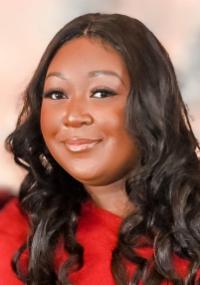MS in Nursing Education

1. What inspired you to pursue a career in nursing?
I was inspired to pursue a career in nursing because I wanted the opportunity to provide compassionate care and advocate for patients during vulnerable moments. Today, nursing empowers me to apply evidence-based practice to make informed decisions that improve outcomes for individuals from diverse backgrounds.
2. Can you share a memorable experience or patient interaction during your clinical rotations?
One meaningful experience this semester involved a patient who lost trust in the medical team. I used therapeutic communication to listen, validate concerns, and help re-establish trust. Being able to improve the patient-provider relationship reaffirmed the importance of empathy and emotional intelligence in nursing practice.
3. How do you balance the academic demands of the nursing program with your personal life?
Balancing academics and personal life have been challenging, but it has instilled in me the discipline and time management skills essential for managing responsibilities across education, nursing practice, and life overall.
4. What specialty within nursing are you most interested in and why?
I am passionate about medical-surgical nursing due to the complexity and diversity of the patient population. This specialty requires managing both clinical conditions and the influence of social determinants of health. It also provides a strong foundation for teaching clinical reasoning to future nurses.
5. How has your perspective on healthcare evolved since starting your nursing education?
I’ve developed a deeper appreciation for interprofessional collaboration, health equity, and the vital role nurses play as educators and advocates. This is not only for patients, but within healthcare as a complex adaptive system.
6. What challenges have you faced in your academic programs, and how did you overcome them?
During my first semester, I struggled with organizing my time to complete assignments. I started working in a new specialty, the Operating Room, and I was juggling competing priorities at home, work, and school. I overcame these challenges by communicating openly with my professor, learning to effectively organize and prioritize tasks, and relying on mentorship and peer support.
7. Can you share a piece of advice for incoming nursing students?
Please be open to every learning opportunity! Ask questions, seek feedback, and remember that growth often comes from being challenging and pushed out of your comfort zone.
8. How do you see nursing as a profession evolving in the next 5–10 years?
Nursing will continue to grow in all sectors, particularly leadership, education, and technology. I believe nurses will increasingly influence healthcare policy, drive innovation, and play a key role in preparing and mentoring the next generation.
9. Have there been any specific mentors who have had a significant impact on your journey?
Yes, Dr. Patricia Bartley Daniele has been an incredible mentor since the beginning of my journey. The guidance she has provided throughout my time at CUNY SPS is immeasurable. Her professionalism, encouragement, and genuine investment in her students' success have shaped the expectations I hold for myself as a future nurse educator.
10. What are your long-term career goals after graduation?
After graduation, I hope to become an Academic Nurse Educator (ANE). I hope to teach medical-surgical nursing to undergraduate students and work toward my doctorate (DNP).
